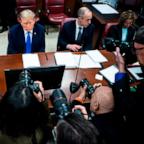Epic group of freshmen ready to take over college basketball
— -- Ask anyone who was there. The fall of 2013 just felt ... different.
Hype is an inescapable temptation of every college basketball preseason. The siren song of YouTube mixtapes wafts forth each year, whispering into our basketball-starved ears, and those mixtapes make promises they can't possibly keep. OK, fine, we admit it: We always buy in. At least a little bit.
Even so, fall 2013 was something else. Bigger. Rarer. More momentous. Kansas' Andrew Wiggins, an impossibly athletic Canadian wing, was walking into the sport with a seemingly ironclad grip on the next available No. 1 overall NBA draft pick -- a remarkable feat, since the No. 2 player in the class, Duke's Jabari Parker, already had one Sports Illustrated cover spread under his belt when he enrolled in college. Not one to be outdone, John Calipari -- the Ray Kroc of the modern basketball meta-game -- had six McDonald's All-Americans, and four top-ranked players at their respective positions, coming to Kentucky. After a freshmen-led national title in 2012 and a half-decade of unmatched enlistment dominance, Coach Cal's coup de recruit was ? so mind-bending it sent normally mild-mannered recruiting analyst Dave Telep into a full-fledged fever:
"It's one thing to say, 'This is the best recruiting class this year,'" Telep, now a scout for the San Antonio Spurs, wrote in 2013. "It's on a completely different level to speak the following phrase: best recruiting class of all time. We're not comparing Kentucky's recruiting class to No. 2 Memphis or No. 3 Kansas anymore. Really what we're talking about here is UK 2013 versus Michigan 1991, the 'Fab Five.'" Maybe you've heard of them.
So, yeah: Long before it began, the 2013-14 season was turned up. One of the most star-studded classes in the one-and-done era was set to storm college sports. Even better? On Nov. 12, 2013, Wiggins and Parker, the top players on every NBA draft board, would meet at the Champions Classic. On the same night, in the same building, No. 1-ranked Kentucky -- whose fans had already started wearing "40-0" T-shirts -- would face No. 2 Michigan State. One's imagination didn't need to run all that wild to Nov. 12 as a basketball Beatles-in-Hamburg, a chance to be there at the start of something special.
On Sept. 27, the first day of official practice, we gave the 2013-14 season an unofficial title: The Year of the Freshmen.
Fair warning: Here we go again.
THE 2016 CLASS is both concentrated and diffuse, deep and wide, less a wellspring of talent than a teeming inland sea.
Prefer your bright young things in clustered superteam configurations? Look no further than Kentucky and Duke -- the modern game's twin titans of talent acquisition -- which welcome, count 'em, eight of the nation's top-20 freshmen in total.
Duke's Harry Giles (No. 1), Jayson Tatum (No. 3), Frank Jackson (No. 10) and Marques Bolden (No. 16), and Kentucky's Bam Adebayo (No. 5), De'Aaron Fox (No. 6), Malik Monk (No. 9) and Wenyen Gabriel (No. 14) represent just the third and fourth classes with at least four top-20 players since ESPN began ranking recruits in 2007. The first two such classes -- the 2011-12 Wildcats and the 2013-14 UK vintage -- both made it to the national title game. Meanwhile, coach Mike Krzyzewski's class is just the third in that span to land both the No. 1 player and? a top-five sidekick in the same haul. The other two? The 2014-15 Blue Devils and -- again -- those Anthony Davis/Michael Kidd-Gilchrist 2011-12 Wildcats. Both won national titles.
Small wonder, then, that Duke and UK find themselves ranked No. 1 and No. 2 in nearly every preseason poll. Small wonder, too, that so much of the 2016-17 oxygen will be hoovered up by just two teams. Recruiting classes like these are rare. Two in one season? Unheard of.
There is one crucial distinction between the two: While Kentucky's hopes rest almost entirely on the newcomers, the Blue Devils' cut-above status as the 2016-17 favorite rests as much on core returners: preseason national player of the year contender Grayson Allen, fifth-year center Amile Jefferson, stalwart glue guy Matt Jones, sophomore shooting guard Luke Kennard. The depth is almost embarrassing. If Giles' knee doesn't cooperate, for example, Krzyzewski still has sophomore center Chase Jeter, a former blue-chip prospect desperate for more minutes, sitting a few seats down the bench. Or Duke could just put Jefferson at the five, play any one of three or four different small-ball lineups, and still? be the best team in the country. No other roster comes close.
"We have the right ingredients to be very good," Krzyzewski told ESPN.com in May. "And that's what we're going to try and do -- be very good."
Translation: We're gonna be awesome.
And then, as always, there's Kansas. The Jayhawks don't have four top-20 players, the slackers, but they do have Josh Jackson -- not only next summer's early leader in the No. 1-overall clubhouse, but perhaps the most immediately impactful newcomer in the country -- joining arguably the sport's best backcourt, playing for inarguably the nation's most consistent coach, Bill Self. In April, 247 Sports' Jerry Mayer announced Jackson was "the top shooting guard I've ever scouted" and the recipient of a "102 overall rating" ... out of 100.
Which would be enough, in any other year, to go all-in on the frosh. Yet there's much, much more.
According to most scouts and NBA types, the greatest strength of the 2016 class is its depth, and the benefits of that bounty have trickled down -- elevating the expectations of annual conference contenders and mere bubble hopefuls alike. UCLA point guard Lonzo Ball might already be the nation's best passer; he is undeniably the program's best hope for a victory in the war to make its own fans care. Washington point guard Markelle Fultz, another early top-overall-pick contender, may or may not drag Lorenzo Romar's Huskies into the NCAA tournament, but it's going to be a blast watching him try.
At Michigan State, Tom Izzo is calling athletic freshman wing Miles Bridges, a native of Flint, Michigan, "the next Flintstone." Jonathan Isaac is the most promising prospect in Florida State basketball history. At NC State, guard Dennis Smith -- who lost his senior high school season to injury and enrolled early, in January -- has been quietly waiting to do this?to other teams' defenders?all the while. Oh, and Arizona would have been here, too, before top prospect Terrance Ferguson went pro.
NBA teams are no less excited. In June, ESPN's Chad Ford estimated that only Ben Simmons and Brandon Ingram, the 2016 draft's top two picks, would crack the top 10 in 2017.
Five freshmen were chosen in the lottery in the '16 draft. Ford's first guess at the 2017 number? Twelve.
HERE'S THE THING about The Year of the Freshmen: We were wrong. We were also kind of right.
Kentucky lost to Michigan State -- so much for 40-0 -- and spent the next three months stumbling through a decent, but decidedly average, 22-9 campaign.
Wiggins was very good but rarely dominant. (His classmate, Joel Embiid, frequently overtook him in the collective talent-projection discussion.) Parker's scoring prowess earned him first-team All-American honors, but his Blue Devils played some of the softest defense of Krzyzewski's 41-year career. The Jayhawks lost to No. 10-seeded Stanford in the second round of the NCAA tournament. Duke got Nae Nae'd by Mercer in the first.
Aaron Gordon, the No. 4 player in that class, was a crucial piece, particularly defensively, for a 33-5 Arizona team. (He also shot 42 percent from the foul line.) Yet Arizona was led mostly by veterans. So was Wichita State, which entered the NCAA tournament 35-0. So was Florida, which finished the regular season on a 23-0 (including an 18-0 SEC record) streak. So was Virginia, where seniors Joe Harris and Akil Mitchell led coach Tony Bennett's sudden rise to an ACC title sweep, and Louisville, where Russ Smith played with manic and underappreciated genius.
By the time the NCAA tournament rolled around, the whole Year of the Freshmen thing felt a little bit silly. Everywhere you looked, upperclassmen reigned.
And then Kentucky -- a No. 8 seed -- upset Wichita State, Louisville, Michigan and Wisconsin en route to the national title game. In two weeks, UK exploded an entire season's worth of anti-hype corrective into two weeks, and vindicated the previous fall's obsession with youth ... only to lose, in the final game of the season, to senior Shabazz Napier and Connecticut.
A similar story has unfolded in the two seasons since. A season ago, Australian wunderkind Ben Simmons arrived at LSU complete with hushed LeBron James comparisons and not-so-hushed exhortations from Shaquille O'Neal. Simmons was excellent. The Tigers weren't. Instead, the 2015-16 season was dominated, from start to finish, by unforgettable seniors.
And yet: Sandwiched between repudiations of our preoccupation with the new came a potent reminder of how powerful it could be. Two years ago, ahead of the 2014-15 season, Calipari added Karl-Anthony Towns, Devin Booker and Tyler Ulis to an unusually intact core. Duke, meanwhile, welcomed Jahlil Okafor, Tyus Jones and Justise Winslow. Kentucky went 38-0 before losing in the Final Four. Two nights later, Duke's freshmen scored 60 of the team's 68 points -- the most ever by rookies in a national title game -- en route to Coach K's fifth championship.
In other words: Every year is The Year of the Freshmen.
This is where we are, one full decade into the one-and-done era. Every college basketball season is either defined by 19-year-old prodigies or noted for the lack thereof. The prism through which we now view the game, for better and for worse, is inextricably tied to the game's most talented, and most maddeningly elusive, participants.
Every fall, the siren song of mixtape hype returns. Thing is, it's always the same song. Only the volume changes. It's as turned up as ever in 2016-17, but who knows? We've been wrong -- and not wrong -- before.
In 2014, after his team's title game defeat to UConn, an exhausted Calipari proclaimed he'd never coached a team so young. "And I hope I don't ever again," he said.
Yet here Calipari is, and here we are. The Year of the Freshmen is dead. Long live the Year of the Freshmen.




